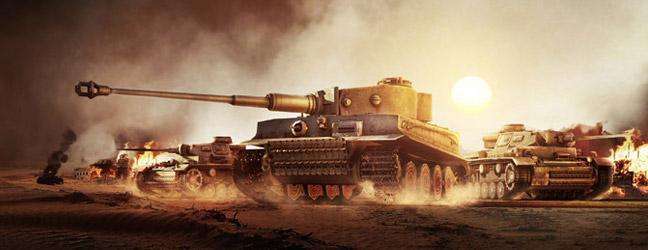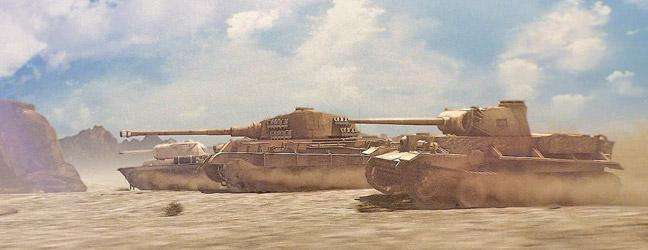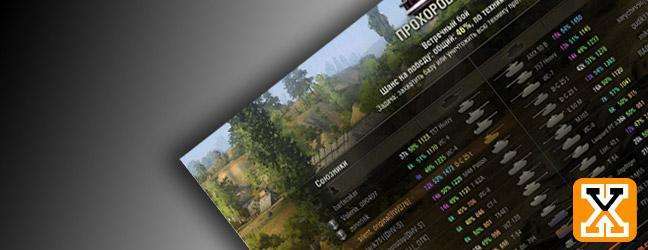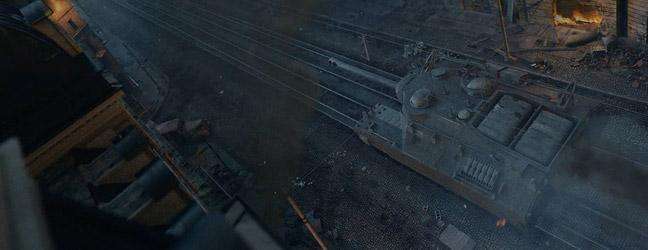The TR1, M26- M26A1 Knuckley a.k.a The Dragon Wagon.
Дата: 10.06.2014 14:56:59
IPaul72: Greetings All! Ever wondered how those broken down tanks and
captured tanks were moved about during the war? Well here is an
article they may answer just a little bit of that question...
The M26 Knuckley a.k.a The Dragon Wagon.  In the April of 1943 a heavy
tractor trailer combination was submitted to the Aberdeen Proving
Ground. This was a forward control tractor with an armored cab
and was produced by the Knuckey Truck Company of San
Francisco. You may well be forgiven if you have not heard of
the Knuckey Truck Company, it was never a well-known
name. Knuckey specialized in custom build heavy off
road machines normally found in use with open-cast mines and
quarrying applications. Knuckey had apparently adapted the
chassis of an existing vehicle, then fitted an armored cab
before passing to the army for its evaluation. Apart from its
massive size the most striking feature was the angular armored cab
with its heavy shuttered windows and radiators, a platform was
provided for the fitting of a M49 ring mount for anti aircraft
defense weapon. Power was provided by a huge Hall-Scott 400
six cylinder petrol engine. This was to be placed over the front
axle it drove through a four speed fuller gear box and three speed
transfer case to the rear bogie and a patented Knuckey
center-pivoted walking beam rear bogie. The walking -beam
configuration would provide 18 inches (457 mm) total movement. The
rear wheels were driven by chains that were lubricated via a total
loss oil system, small oil pipes dripping oil on to the chains that
would end up on the road. Maximum road speed was 26 MPH or 42 KPH
and a fuel consumption of 1.08 miles per gallon! Little attention
was paid to comfort and the six man crew, although the driver was
given hydraulic assistance on the steering. This could be
considered very little compensation for having to sit inside
an armored box next to one of the largest petrol
engines in the world.
In the April of 1943 a heavy
tractor trailer combination was submitted to the Aberdeen Proving
Ground. This was a forward control tractor with an armored cab
and was produced by the Knuckey Truck Company of San
Francisco. You may well be forgiven if you have not heard of
the Knuckey Truck Company, it was never a well-known
name. Knuckey specialized in custom build heavy off
road machines normally found in use with open-cast mines and
quarrying applications. Knuckey had apparently adapted the
chassis of an existing vehicle, then fitted an armored cab
before passing to the army for its evaluation. Apart from its
massive size the most striking feature was the angular armored cab
with its heavy shuttered windows and radiators, a platform was
provided for the fitting of a M49 ring mount for anti aircraft
defense weapon. Power was provided by a huge Hall-Scott 400
six cylinder petrol engine. This was to be placed over the front
axle it drove through a four speed fuller gear box and three speed
transfer case to the rear bogie and a patented Knuckey
center-pivoted walking beam rear bogie. The walking -beam
configuration would provide 18 inches (457 mm) total movement. The
rear wheels were driven by chains that were lubricated via a total
loss oil system, small oil pipes dripping oil on to the chains that
would end up on the road. Maximum road speed was 26 MPH or 42 KPH
and a fuel consumption of 1.08 miles per gallon! Little attention
was paid to comfort and the six man crew, although the driver was
given hydraulic assistance on the steering. This could be
considered very little compensation for having to sit inside
an armored box next to one of the largest petrol
engines in the world.  Braking was only on the rear wheels and they were operated by
air assistance, there were also separate hand controls were
mounted to the steering column for operating the breaks on other
side wagon to help manoeuvre during recovery operations. Three
winches were provided twin 60,000 lb at the rear with a single
35,000 lb fitted to the front. The rear winches operated from a
platform at the rear just before the spare wheel, the front one was
operated from inside the cab. The Knuckley wasn't short when it
came to carrying recovery equipment, there was a folding
'A' frame that was carried and could enable the vehicle to act as a
recovery unit. There was also the the ancillary equipment, this
included oxygen and acetylene bottles for cutting and welding rigid
straight bars for recovery. There was also a "whiffletree" for
use with the recovery equipment and the usual complement of
pioneer tools and vehicle maintenance/repair equipment.
Braking was only on the rear wheels and they were operated by
air assistance, there were also separate hand controls were
mounted to the steering column for operating the breaks on other
side wagon to help manoeuvre during recovery operations. Three
winches were provided twin 60,000 lb at the rear with a single
35,000 lb fitted to the front. The rear winches operated from a
platform at the rear just before the spare wheel, the front one was
operated from inside the cab. The Knuckley wasn't short when it
came to carrying recovery equipment, there was a folding
'A' frame that was carried and could enable the vehicle to act as a
recovery unit. There was also the the ancillary equipment, this
included oxygen and acetylene bottles for cutting and welding rigid
straight bars for recovery. There was also a "whiffletree" for
use with the recovery equipment and the usual complement of
pioneer tools and vehicle maintenance/repair equipment.
 A single spare wheel for the
Tractor and trailer was fitted behind the cab on the right hand
side. A small crane was provided for the handling of the spare
wheel, also large semi- automatic fifth wheel coupling was fitted
to the rear of the of the rear bogie setup. After initial
tests the A P G approved the design and the tractor was to be put
into production. Sadly Knuckey lacked the production capability for
the numbers that was demanded by the army. So the production
contract was awarded to the Pacific Car and Foundry Company from
Renton Seattle. This company was better known for producing railway
locomotives the car in the name was a reference to the rail cars.
The Tractor that the company produced was to be described by the
company as the TR-1 and it was to retain most of the features of
the prototype. However, the seven man armored cab was to become a
little more cluttered, the original Hall-Scott Model 400 engine was
replaced by a purpose built military model 440 Hall-Scott petrol
engine. Knuckeys involvement in this project was now to provide the
rear bogies for the tractor in June 1943 after the design was
standardized.
A single spare wheel for the
Tractor and trailer was fitted behind the cab on the right hand
side. A small crane was provided for the handling of the spare
wheel, also large semi- automatic fifth wheel coupling was fitted
to the rear of the of the rear bogie setup. After initial
tests the A P G approved the design and the tractor was to be put
into production. Sadly Knuckey lacked the production capability for
the numbers that was demanded by the army. So the production
contract was awarded to the Pacific Car and Foundry Company from
Renton Seattle. This company was better known for producing railway
locomotives the car in the name was a reference to the rail cars.
The Tractor that the company produced was to be described by the
company as the TR-1 and it was to retain most of the features of
the prototype. However, the seven man armored cab was to become a
little more cluttered, the original Hall-Scott Model 400 engine was
replaced by a purpose built military model 440 Hall-Scott petrol
engine. Knuckeys involvement in this project was now to provide the
rear bogies for the tractor in June 1943 after the design was
standardized.  The next change would come in the October of 1944, this was
an open cabbed unarmored version that would standardized as the
M26A1. This was due to the fact that the tactical advantages of the
armoured were no longer needed. The total production numbers of the
M26 between 1943 and 1945 was 1372 many of these would remain in
Europe after the war and would continue to be used by Heavy Haulage
operators many who would lose that big heavy cab. Trailer
specs of the M15 trailer.
The next change would come in the October of 1944, this was
an open cabbed unarmored version that would standardized as the
M26A1. This was due to the fact that the tactical advantages of the
armoured were no longer needed. The total production numbers of the
M26 between 1943 and 1945 was 1372 many of these would remain in
Europe after the war and would continue to be used by Heavy Haulage
operators many who would lose that big heavy cab. Trailer
specs of the M15 trailer.
 The M15 trailer was designed for use
with the M26 and M23A1 tractors. It had Eight large 14.00-24
combat tyres taking the load at the rear of the trailer the
suspension was solid walking beams with trunion shafts. Full
service air brakes provided the braking power but there was no
parking brake option on this system. The wheel base of this trailer
could be increased or decreased for aid in loading or transporting.
To the rear there was two large ramps that allowed loading of other
vehicles in the field, raising of the ramps was done by the winch
on the M26. Two strut legs would support the front of the trailer
when it was not coupled to the M26. Stowage for the recovery
equipment was provided on the upper deck toward the front of the
trailer. Wire cable guides were built in to the trailer so the
winch wires from the M26 could be threaded through these during
recovery operations. The M15 would have its payload increased
from 40 Tons to 45 Tons and would be known as the M15A1 and would
have hinged covers over the rear wheels it would again be modified
to cope with the heaver tanks. This was then to be known as the
M15A2 some of these would remain in service till the Vietnam war.
The M26 Tractor and the M 15 Trailer make up the M25 Tank
Transporter. All Credits go to a Mister Joel of Parola
Historical vehicle museum Finland. Kind Regards IPaul72
The M15 trailer was designed for use
with the M26 and M23A1 tractors. It had Eight large 14.00-24
combat tyres taking the load at the rear of the trailer the
suspension was solid walking beams with trunion shafts. Full
service air brakes provided the braking power but there was no
parking brake option on this system. The wheel base of this trailer
could be increased or decreased for aid in loading or transporting.
To the rear there was two large ramps that allowed loading of other
vehicles in the field, raising of the ramps was done by the winch
on the M26. Two strut legs would support the front of the trailer
when it was not coupled to the M26. Stowage for the recovery
equipment was provided on the upper deck toward the front of the
trailer. Wire cable guides were built in to the trailer so the
winch wires from the M26 could be threaded through these during
recovery operations. The M15 would have its payload increased
from 40 Tons to 45 Tons and would be known as the M15A1 and would
have hinged covers over the rear wheels it would again be modified
to cope with the heaver tanks. This was then to be known as the
M15A2 some of these would remain in service till the Vietnam war.
The M26 Tractor and the M 15 Trailer make up the M25 Tank
Transporter. All Credits go to a Mister Joel of Parola
Historical vehicle museum Finland. Kind Regards IPaul72
 In the April of 1943 a heavy
tractor trailer combination was submitted to the Aberdeen Proving
Ground. This was a forward control tractor with an armored cab
and was produced by the Knuckey Truck Company of San
Francisco. You may well be forgiven if you have not heard of
the Knuckey Truck Company, it was never a well-known
name. Knuckey specialized in custom build heavy off
road machines normally found in use with open-cast mines and
quarrying applications. Knuckey had apparently adapted the
chassis of an existing vehicle, then fitted an armored cab
before passing to the army for its evaluation. Apart from its
massive size the most striking feature was the angular armored cab
with its heavy shuttered windows and radiators, a platform was
provided for the fitting of a M49 ring mount for anti aircraft
defense weapon. Power was provided by a huge Hall-Scott 400
six cylinder petrol engine. This was to be placed over the front
axle it drove through a four speed fuller gear box and three speed
transfer case to the rear bogie and a patented Knuckey
center-pivoted walking beam rear bogie. The walking -beam
configuration would provide 18 inches (457 mm) total movement. The
rear wheels were driven by chains that were lubricated via a total
loss oil system, small oil pipes dripping oil on to the chains that
would end up on the road. Maximum road speed was 26 MPH or 42 KPH
and a fuel consumption of 1.08 miles per gallon! Little attention
was paid to comfort and the six man crew, although the driver was
given hydraulic assistance on the steering. This could be
considered very little compensation for having to sit inside
an armored box next to one of the largest petrol
engines in the world.
In the April of 1943 a heavy
tractor trailer combination was submitted to the Aberdeen Proving
Ground. This was a forward control tractor with an armored cab
and was produced by the Knuckey Truck Company of San
Francisco. You may well be forgiven if you have not heard of
the Knuckey Truck Company, it was never a well-known
name. Knuckey specialized in custom build heavy off
road machines normally found in use with open-cast mines and
quarrying applications. Knuckey had apparently adapted the
chassis of an existing vehicle, then fitted an armored cab
before passing to the army for its evaluation. Apart from its
massive size the most striking feature was the angular armored cab
with its heavy shuttered windows and radiators, a platform was
provided for the fitting of a M49 ring mount for anti aircraft
defense weapon. Power was provided by a huge Hall-Scott 400
six cylinder petrol engine. This was to be placed over the front
axle it drove through a four speed fuller gear box and three speed
transfer case to the rear bogie and a patented Knuckey
center-pivoted walking beam rear bogie. The walking -beam
configuration would provide 18 inches (457 mm) total movement. The
rear wheels were driven by chains that were lubricated via a total
loss oil system, small oil pipes dripping oil on to the chains that
would end up on the road. Maximum road speed was 26 MPH or 42 KPH
and a fuel consumption of 1.08 miles per gallon! Little attention
was paid to comfort and the six man crew, although the driver was
given hydraulic assistance on the steering. This could be
considered very little compensation for having to sit inside
an armored box next to one of the largest petrol
engines in the world.  Braking was only on the rear wheels and they were operated by
air assistance, there were also separate hand controls were
mounted to the steering column for operating the breaks on other
side wagon to help manoeuvre during recovery operations. Three
winches were provided twin 60,000 lb at the rear with a single
35,000 lb fitted to the front. The rear winches operated from a
platform at the rear just before the spare wheel, the front one was
operated from inside the cab. The Knuckley wasn't short when it
came to carrying recovery equipment, there was a folding
'A' frame that was carried and could enable the vehicle to act as a
recovery unit. There was also the the ancillary equipment, this
included oxygen and acetylene bottles for cutting and welding rigid
straight bars for recovery. There was also a "whiffletree" for
use with the recovery equipment and the usual complement of
pioneer tools and vehicle maintenance/repair equipment.
Braking was only on the rear wheels and they were operated by
air assistance, there were also separate hand controls were
mounted to the steering column for operating the breaks on other
side wagon to help manoeuvre during recovery operations. Three
winches were provided twin 60,000 lb at the rear with a single
35,000 lb fitted to the front. The rear winches operated from a
platform at the rear just before the spare wheel, the front one was
operated from inside the cab. The Knuckley wasn't short when it
came to carrying recovery equipment, there was a folding
'A' frame that was carried and could enable the vehicle to act as a
recovery unit. There was also the the ancillary equipment, this
included oxygen and acetylene bottles for cutting and welding rigid
straight bars for recovery. There was also a "whiffletree" for
use with the recovery equipment and the usual complement of
pioneer tools and vehicle maintenance/repair equipment.
 A single spare wheel for the
Tractor and trailer was fitted behind the cab on the right hand
side. A small crane was provided for the handling of the spare
wheel, also large semi- automatic fifth wheel coupling was fitted
to the rear of the of the rear bogie setup. After initial
tests the A P G approved the design and the tractor was to be put
into production. Sadly Knuckey lacked the production capability for
the numbers that was demanded by the army. So the production
contract was awarded to the Pacific Car and Foundry Company from
Renton Seattle. This company was better known for producing railway
locomotives the car in the name was a reference to the rail cars.
The Tractor that the company produced was to be described by the
company as the TR-1 and it was to retain most of the features of
the prototype. However, the seven man armored cab was to become a
little more cluttered, the original Hall-Scott Model 400 engine was
replaced by a purpose built military model 440 Hall-Scott petrol
engine. Knuckeys involvement in this project was now to provide the
rear bogies for the tractor in June 1943 after the design was
standardized.
A single spare wheel for the
Tractor and trailer was fitted behind the cab on the right hand
side. A small crane was provided for the handling of the spare
wheel, also large semi- automatic fifth wheel coupling was fitted
to the rear of the of the rear bogie setup. After initial
tests the A P G approved the design and the tractor was to be put
into production. Sadly Knuckey lacked the production capability for
the numbers that was demanded by the army. So the production
contract was awarded to the Pacific Car and Foundry Company from
Renton Seattle. This company was better known for producing railway
locomotives the car in the name was a reference to the rail cars.
The Tractor that the company produced was to be described by the
company as the TR-1 and it was to retain most of the features of
the prototype. However, the seven man armored cab was to become a
little more cluttered, the original Hall-Scott Model 400 engine was
replaced by a purpose built military model 440 Hall-Scott petrol
engine. Knuckeys involvement in this project was now to provide the
rear bogies for the tractor in June 1943 after the design was
standardized.  The next change would come in the October of 1944, this was
an open cabbed unarmored version that would standardized as the
M26A1. This was due to the fact that the tactical advantages of the
armoured were no longer needed. The total production numbers of the
M26 between 1943 and 1945 was 1372 many of these would remain in
Europe after the war and would continue to be used by Heavy Haulage
operators many who would lose that big heavy cab. Trailer
specs of the M15 trailer.
The next change would come in the October of 1944, this was
an open cabbed unarmored version that would standardized as the
M26A1. This was due to the fact that the tactical advantages of the
armoured were no longer needed. The total production numbers of the
M26 between 1943 and 1945 was 1372 many of these would remain in
Europe after the war and would continue to be used by Heavy Haulage
operators many who would lose that big heavy cab. Trailer
specs of the M15 trailer. The M15 trailer was designed for use
with the M26 and M23A1 tractors. It had Eight large 14.00-24
combat tyres taking the load at the rear of the trailer the
suspension was solid walking beams with trunion shafts. Full
service air brakes provided the braking power but there was no
parking brake option on this system. The wheel base of this trailer
could be increased or decreased for aid in loading or transporting.
To the rear there was two large ramps that allowed loading of other
vehicles in the field, raising of the ramps was done by the winch
on the M26. Two strut legs would support the front of the trailer
when it was not coupled to the M26. Stowage for the recovery
equipment was provided on the upper deck toward the front of the
trailer. Wire cable guides were built in to the trailer so the
winch wires from the M26 could be threaded through these during
recovery operations. The M15 would have its payload increased
from 40 Tons to 45 Tons and would be known as the M15A1 and would
have hinged covers over the rear wheels it would again be modified
to cope with the heaver tanks. This was then to be known as the
M15A2 some of these would remain in service till the Vietnam war.
The M26 Tractor and the M 15 Trailer make up the M25 Tank
Transporter. All Credits go to a Mister Joel of Parola
Historical vehicle museum Finland. Kind Regards IPaul72
The M15 trailer was designed for use
with the M26 and M23A1 tractors. It had Eight large 14.00-24
combat tyres taking the load at the rear of the trailer the
suspension was solid walking beams with trunion shafts. Full
service air brakes provided the braking power but there was no
parking brake option on this system. The wheel base of this trailer
could be increased or decreased for aid in loading or transporting.
To the rear there was two large ramps that allowed loading of other
vehicles in the field, raising of the ramps was done by the winch
on the M26. Two strut legs would support the front of the trailer
when it was not coupled to the M26. Stowage for the recovery
equipment was provided on the upper deck toward the front of the
trailer. Wire cable guides were built in to the trailer so the
winch wires from the M26 could be threaded through these during
recovery operations. The M15 would have its payload increased
from 40 Tons to 45 Tons and would be known as the M15A1 and would
have hinged covers over the rear wheels it would again be modified
to cope with the heaver tanks. This was then to be known as the
M15A2 some of these would remain in service till the Vietnam war.
The M26 Tractor and the M 15 Trailer make up the M25 Tank
Transporter. All Credits go to a Mister Joel of Parola
Historical vehicle museum Finland. Kind Regards IPaul72
The TR1, M26- M26A1 Knuckley a.k.a The Dragon Wagon.














